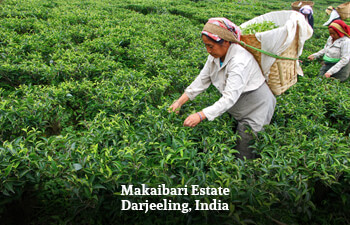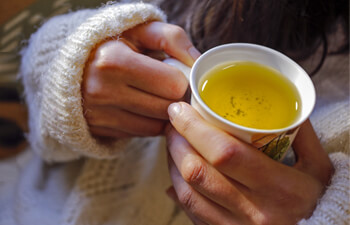Organic Darjeeling Makaibari Estate 1st Flush Black Tea

This organic loose tea from the first flush harvest is biodynamically farmed at the Makaibari estate in India's Darjeeling district. Established in 1859, Makaibari is the oldest estate in Darjeeling, where a strong commitment to sustainable farming prevails. This Fair Trade Certified organic Indian tea is made from the celebrated first harvest of early Spring, called the "first flush." Its distinctive citrusy cup has a fragrance all its own, with nuances of green and black tea.
Our First Flush Darjeeling delivers a vibrant infusion with lively astringency and classic first flush character. The luminous amber-colored liquor features a thicker mouthfeel than previous first flush production years, and offers notes of dried orange rind, lime zest and Muscat grape with an enticing aroma reminiscent of orange blossom. To fully appreciate the delicate high notes, we recommend infusing first flush Darjeeling organic black tea with a slightly lower water temperature and shorter steeping time than that of other black teas.
Ingredients: organic and Fair Trade Certified Indian black tea
Origin: Makaibari Estate, Darjeeling, India

Located in eastern India, Darjeeling is nestled at the foothills of the Himalayas and tucked between Bhutan and Nepal. It is one of the most famous regions in the world for tea production, and has a long history of tea cultivation dating back to the early 1800s. Black teas are the most traditional types of tea from this area, but more recently white, green and oolong teas have been manufactured. Darjeeling’s highland subtropical climate and elevation (6000 feet above sea level) make it ideal for growing tea. Makaibari Tea Estate was founded in 1859, and is the oldest and steepest estate in Darjeeling. Makaibari is a biodynamic and organic certified tea garden and follows a form of “integrated forest management.” They also use permaculture in many of their practices. Certified Fair Trade in 1993, Makaibari has used their premiums to provide stipends for University studies, microfinance programs, education investments and health training, among many other initiatives.
Read our field notes from our visit to Makaibari!
Steeping Instructions

At Arbor Teas, we believe tea should be brewed to suit your personal taste. We’re happy to make recommendations to get you started, but don’t hesitate to experiment! When brewing your tea, your main considerations are tea quantity, water temperature, and steeping time. Brewing our First Flush Darjeeling like any other black tea can produce a fantastic cup, no doubt, but because this tea behaves more like a green tea, we recommend steeping it at a lower temperature (approximately 170 to 180 degrees F) for only 2-3 minutes to avoid excess astringency. For the best flavor, use fresh water whenever possible, and avoid overboiling. Try not to steep your tea longer than necessary, as you’ll extract undesirable bitterness from the leaves. If you want a stronger brew, don’t steep longer, just use more tea. And don’t forget to re-steep your tea leaves to get the most out of your leaf!
Looking for more info? Check out our How-To Guides and Eco-Brewing Tips!
Staff Perspectives
 Lea
Lea
"I love when we open this bag for the first time, the enchanting aroma of spring in Makaibari is palpable. "
 Trish
Trish
"This is lighter and more floral than our 2nd flush, and I think it's a bit stronger."
 Aubrey
Aubrey
"Light and VERY dry - if there were bubbles, you'd practically have champagne!"
Health Benefits

Like all true tea, black tea offers many potential health benefits. Research has found that tea (Camellia sinensis) can have many positive effects on human health, including improved cardiovascular function, cancer risk reduction, improved immune function, improved oral health, and help with weight management. Tea is also full of polyphenols, which are a class of antioxidant that help your body maintain homeostasis and balance your stress levels. Black tea specifically has been found to regulate blood sugar in diabetics better than other types of tea, according to a study done by the University of Massachusetts Amherst.
For more information about the health benefits of black tea and other types of tea, and for direct sources of the above information, check out our Tea Health Benefits page!
Please note: the information above is for educational purposes only and has not been evaluated by the Food and Drug Administration. This information is not intended to diagnose, treat, cure, or prevent any disease.








